New Content Editor Login
 |
| Search |
|
|

|
 |
Nostalgia and History
The Academy
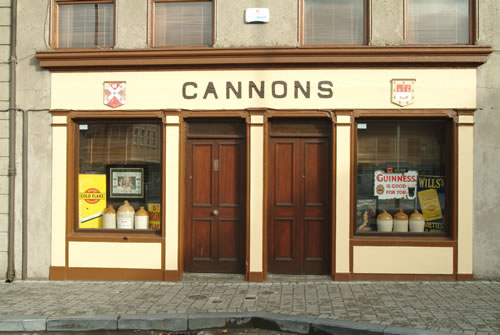 |
| Cannons - The Academy |
ONCE UPON a time there was a man standing on Lecanvey pier. There was a storm blowing. The waves were high and crashing over the pier. A young boy who had broken away from his mother was tempting the waves and rushing from them as they lipped over the pier. He wore a school cap. A man with a slight heart condition advised him not to go near the pier edge but he was a young nearróg and he walked into danger.
A great wave swept him out to sea. The gentleperson with the heart condition, jumped in, and swimming vigorously swam out to where the young brat was going under for the third time. With great difficulty he dragged him towards the pier. A wave carried them in and deposited the gentleman and the young brat close to the back wall. The child rushed away towards his mother. The gentleman was vomiting seaweed and having a mild heart attack. While still in this condition the mother approached with the young child by the hand.
"Did you save my Johnny?" she asked.
"I did," he replied, his heart palpitating.
"Well where is his bloody school cap?" she asked.
She, as well as her son, falls into the definition of ‘nearróg’.
I don’t know if this word exists. It might exist in another form. Long ago and in another world Eddie Cannon often used it. He would say of someone "he was a right nearróg," and we would all agree. There were plenty of nearrógs around then and there still are. After he used the word often enough we got to know its meaning. The meaning came through use. There were no nearrógs in Eddie Cannons for they were always more or less decent men who entered that academy. Now if you have never been in Eddie Cannons then you have not lived. They have theme pubs and new pubs trying to imitate old pubs and you have drab pubs and you have large pubs with no atmosphere but the real thing was Eddie Cannon’s. We had standards in Eddie Cannon’s.
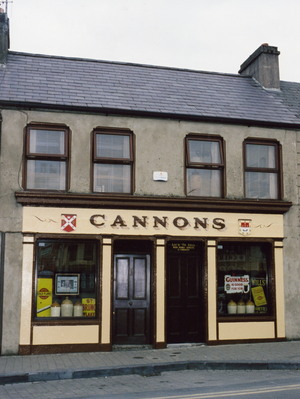 |
No dubious language in the presence of women and any troublemaker was barred was one of the rules. Eddie pointed his bony finger towards the door and you were dismissed from the finest club in Castlebar as Adam and Eve were banished from the garden. You might slip back six months later with your head hung low. Gradually you would be introduced back into the company of the academy. I recalled a very rich man of this town being shown to the door. He pleaded that his membership might be restored but no. He was banished and that was it. No pleading, no political pull, could reinstate him to his former position.
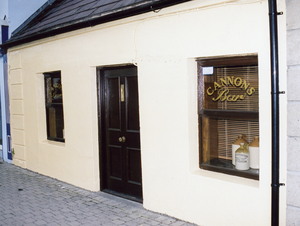 |
They say that a pub was a poor man’s university and this one was. Eddie was very learned, a fine artist and he had an extensive library of books. If there was doubt over any fact he could rush up stairs, consult some ancient encyclopaedia, and return with the answer. With the closing of the pub that noble company was scattered and set off to find its equivalent but they never did. I recall now Michael Morgan, one of the gentlest men I ever met. He is still alive and still bright and he is a great age. He had a soft voice and it was never raised except when some nearróg or other crossed him on the price of cattle or the best manner on how to plant vegetables. In these two fields he was an expert. But there were always those who thought they new better. If the argument got too hot he simply walked away as a good gentleman should. Michael is one of nature’s gentlemen and his life as a drover has been well documented. He belonged to the Old World of fairs when cattle were driven to the markets during the early hours of the dawn, come rain or snow.
He had a great eye for a beast and it was he who drove them to the "specials" as they the trains were called. There the cattle were loaded in great cattle cribs and transported to Dublin. This life he enjoyed and understood. He entertained us with many a story. Drovers belong to history for once upon a time in Ireland your wealth was judged by the amount of cattle you owned and we know from reading the Annals of the Four Masters that several cattle raids were carried out during our turbulent history. The greatest battle every fought was caused by the Bull of Cooley. So Michael Morgan was a most interesting man and he had many a winter’s tale to tell and he told them well. Greg McDonnell and John Scully often arrived in with wonders to relate. They travelled around the county for the County Council and anywhere there was a breakdown they went and fixed it. Thus they had a knowledge of whatever happened in the county. And some nights we sang. We sang from the light operas particularly Michael Hynes who had a fine tenor voice and had a good knowledge of these things.
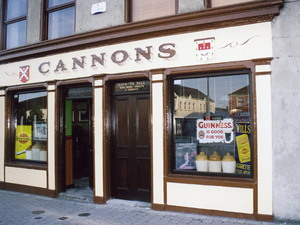 |
On Saturday we discussed the economy. We had certain fail-safe standards by which to judge the value of money but the most important one was the price of a hundred of cabbage. The price of cabbage fluctuated like the stock exchange and it was a good indicator of the health or illness of the economy.
Saturday was a busy day – for the Market Square outside the door was filled with farmers selling their produce. They invariably made their way into the pub where the pint was always a few pence lower than in other places. Outside there was a great pair of iron scales; much more even in their dispensing of justice than the scales of Justice on the entrance to Dublin Castle. Pyramids of potatoes were placed on a great iron tray suspended from four chains and then huge weights were banged on to the other. When they evened up a document was given to the farmer stating the weight of his potatoes. This he carried to merchants and purchasers. Thus, in this small pub we could judge the health of the economy. This system but in a much grander form is used by economists to judge the financial health of the nation. I believe that one economist received a Noble Prize for the manner in which he listed the health of the hundred most important business in the United States. But we had twigged on to this many years ago in Eddie Cannons pub. It was more than a poor man’s university.
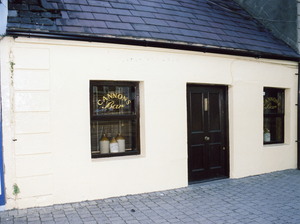 |
We were always fair in our judgements of people and it was only at the very end of debate that we would say of certain individuals that they were nearrógs. These were thorny, prickly people, who never gave up annoying you. They kept on prodding at you until they irked you and stirred your anger. They were never happy in themselves and their faces even in repose possessed nearróg lines. They set seeds of dissension and the fruit from these seeds are thorns. They were born to create trouble and to stir calm waters into tempests. If you are to judge a person’s character the best manner to do it is to observe them in repose when they let the muscles of the face relax. We write our autobiography through the lines in our faces. I suppose that someone has won a prize for a thesis on the same matter but we had cottoned on to it a long time ago in Eddie Cannon’s pub. No wonder the place was called The Academy. Now the word Academy has a very illustrious past and I will give a short definition taken from the Encyclopaedia Britannica: "A society of learned individuals organized to advance art, science, literature, music, or some other cultural or intellectual area of endeavour. From its original reference in Greek to the philosophical school of Plato, the word has come to refer much more generally to an institution of learning or a group of learned persons."
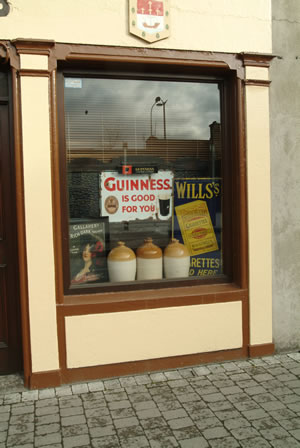 |
| Cannons |
Now by any definition I think that the members of Eddie Cannon’s pub fitted into this definition. Eddie fitted into the guise of Socrates for he was always redefining, and clarifying words. Every opinion was tested and everyone’s opinion was equal. It was a true democracy. Unfortunate Eddie did not have the authority to confer degrees but if he did there would be several people with doctorates about this town.
So the word nearróg I received from Eddie. It must have its derivations in Irish for Irish can be very powerful in its expressions. Irish is not under the jurisdiction of the politically correct.
Nearrógs are born to stir up trouble. They are whingers and complainers and they can set street against street and neighbour against neighbour. They can twist words and take them out of context and circumstance. They are like they warrior who marches through a valley and after he is left thorns grow. You will find them everywhere; in county councils, on education boards, in the Dáil, amongst writers and poets. They had been created by God to test the virtue of Good Men. There must have been nearrógs on the Blasket Islands for the society described by the writers are much too good. There must have been the same nearrógs on the Aran Islands but they rarely turn up in Irish writing although O’Cadhain particularly in Cré na Cille addresses these issues. With the nearróg the bottle is always half empty and life is always grey. They are not merry and I don’t think that they enjoy a Merry Christmas. There is always something wrong with the world and if they were in charge then everything would be much better according to themselves. I know a club in Dublin which had its sprinkling of nearrógs. They were always complaining and nothing was ever right so they were all elected on to the committee and they got a dose of their own medicine as all the decent members began to make complaints. Nearrógs cannot be in peace with themselves and others and they would fight with their own toenails.
The poet Kavanagh used to drink in Mc Daid’s pub. One day the poet Donagh McDonagh, son of the patriot, arrived in and began to attach him. Now the same Donagh had a hump. Kavanagh let him rage on. When Donagh was going out Kavanagh called to him "Donagh, the venom must be in the hump."
Nearrógs think that they know it all. If you should encounter a nearróg avoid them for they will bring tribulation to your soul. There are secret nearrógs who conceal their disposition under wraps but give them a few drinks and their characters will change.
There are people whose very presence restores peace and calm. I suppose they were created as an antibody to the nearróg. Their gentle disposition calms troubled waters because they are calm within and not seething with suppressed anger.
Michael Morgan was such a man. He had a calming effect on any company and there was always and still is a smile upon his face.
The backdrop against which all these things happened has greatly changed. The market squares has changed. The great scales have disappeared and so has the small toll house beside it and now we have raised platform like those of any Italian city except we do not have the sun to warm the granite slabs. There is a great monument raised to the Races of Castlebar. There was a French market there recently and that was no bad thing. The small intimacy of the square has been destroyed. Traffic is choked up and great cranes swing above the town with massive buckets of cement and pallets of timber. There seems to be no end to building. It goes on an on and new estates are built each day. Instead of immigrating we had to invite in labour from abroad. Castlebar is a multilingual place. You don’t have to leave the borders of the town to learn, Russian, Chinese, Romanian, Polish and Swahili. This is a good thing and they will bond into society. In fact the next generation will be able to speak Irish better than ourselves and may have more regard for it. You always need new blood in a place.
The nearróg of course would not agree with this point of view at all. But these new arrival are sending home letters and money to their families just as the Irish of this county did when the went to England and America.
I was taught to believe that the Celts were a noble race. Well there is no such thing as a Celtic race as we are a mixture of everything. DNA in the future will reveal a lot about us. We call ourselves the Land of Saints and Scholars but this is another myth and don’t talk to me about the Celtic imagination.
We are not saints. Many are lapsed Catholics. We are still very generous but I note on the papers that the new arrivals are complaining about how they are treated by the nouveau riche. In some places the are almost reduced to the condition of slaves. Yes! We are as good and as bad as the rest. Some landlords treated their tenants in a better fashion. You can possess all things but if you lose your heart then you are charred ashes within.
The New Year has started. It will unfold mysteriously and no one can look into the seeds of time. There will be a disaster somewhere. A train will go off the rails. Floods will sweep houses away. George Bush will get further stuck in the morass of Iraq. The stock exchange will get the jitters and last years pop stars will wonder why they are confined to the dustbin of history. Bono will still have more to say and Bob Geldof will still complain. I suppose he is one of the better nearrógs.
But for the ordinary person they will get on with life. One has to drag oneself up and continue on. That is the way it has always been and somewhere at some corner or other is a nearróg, ready to whinge and complain and stir up trouble.
© Copyright 2006 by the author(s)/photographer(s) and www.castlebar.ie
Top of Page
|
|
 |
Nostalgia and History
Latest Headlines
|

|